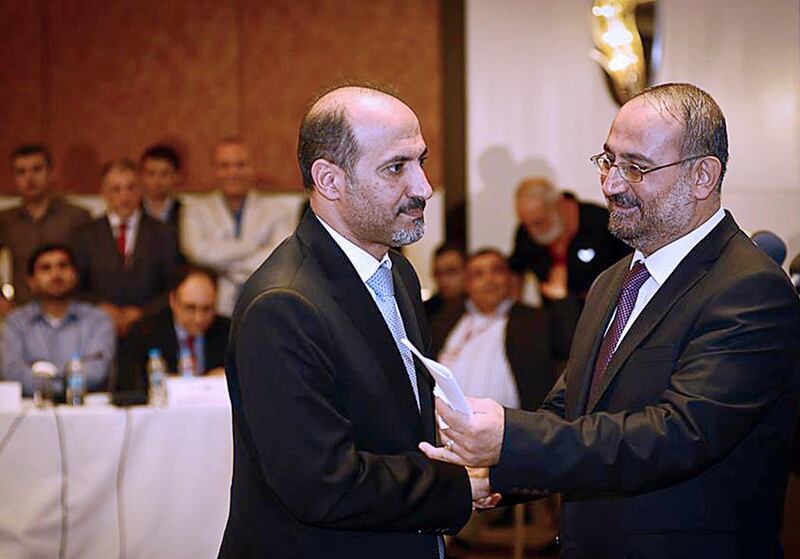Istanbul // A US-Russian deal to dismantle Syria’s chemical weapons is also a tacit agreement by Washington and Moscow that President Bashar Al Assad will remain in power until mid-2014, according to members of Syria’s opposition and analysts.
Under the terms of the decommissioning framework, drawn up on Saturday, production and mixing facilities for chemical munitions will be destroyed by November, with the “complete elimination of all chemical weapons material and equipment in the first half of 2014”.
That timetable coincides with the ending of Mr Al Assad’s second seven-year term of office. A presidential election – in previous years this was an uncontested referendum endorsing Assad family rule – is due to take place in July 2014.
Mr Al Assad has made it clear he intends to serve out the rest of his term and that he may seek re-election. Iran, a major backer of the Syrian regime, has similarly endorsed the prospect of him winning a third term.
“It clearly serves the purposes of America and Russia to have Assad stay in place until the elections in 2014. We have heard rumours of such a deal for some time and that now seems to be confirmed, Assad will be staying,” said a Syrian dissident in Damascus.
While pleased with the prospect of stripping chemical weapons from Syria, he said the deal should have been linked to a ceasefire.
“We wanted to see a full package – something to stop the fighting and take the chemical weapons away,” he said.
The opposition Syrian National Coalition (SNC) on Sunday said the deal should include a ban on the use of air strikes and ballistic missiles against civilians.
“Chemical weapons attacks are a part of a bigger scheme of crimes against humanity committed by the Assad regime, including using the Syrian air forces and ballistic missiles on residential areas,” the SNC said in a statement posted on its official website.
“The Syrian Coalition insists that the prohibition of the use of chemical weapons, which killed more than 1,400 Syrian civilians, be extended to include the prohibition of the use of air forces and ballistic missiles on residential areas.”
General Salim Idriss, commander of the Syrian Military Council, the SNC’s armed wing, had said earlier that the deal helped Mr Al Assad and did nothing for the rebel cause.
Gen Idriss also claimed that chemical weapons were being moved to neighbouring Lebanon and Iraq, in order to hide them from UN teams.
“Everything we have seen makes its clear that the welfare of the Syrian people is really not of concern to the international community, and the Americans just do not want Assad gone,” said another Syrian opposition figure.
“It seems this chemical weapons issue is all about Israel’s security, it really is not about making the Syrian people any safer.”
In the only official Syrian reaction to the deal so far, the minister of state for national reconciliation Ali Haidar described it as a “victory”.
“On one hand, it helps the Syrians emerge from the crisis and on the other it has allowed for averting war against Syria ...,” Mr Haidar told the Russian news agency Ria Novosti.
“It’s a victory for Syria that was achieved thanks to our Russian friends.”
Syrian state-run media have given extensive coverage to the chemical weapons decommissioning, a sign that Damascus is satisfied with the outcome.
Once a taboo subject – Syria did not acknowledge having chemical weapons until last week – pro-regime media outlets are now reporting UN inspectors will begin the decommissioning process by November.
Al Watan, a privately owned pro-regime newspaper, carried a story on Sunday citing US and Russian estimate that there are 45 chemical weapons sites in Syria, including stocks of mustard gas and sarin.
Sana, the official Syrian news agency, reported that the chemical weapons agreement was “greeted with dismay ... in Turkey and [by] the terrorist militias in Syria and their patron the Doha Coalition [SNC]”.
“Time is what Assad wants and defusing the Syrian chemical stocks will take lots of time,” said an independent Syrian analyst.
“The rebels are not happy with this deal, they see Assad has just bought himself months and months, during which the Americans will not attack and he will use that time to hit the rebels,” the analyst said.
As the US-Russian deal on chemical weapons was being formalised on Saturday, Syria’s opposition chose Ahmed Touma as its interim prime minister at a meeting in Istanbul, and voted to admit the Kurdish National Council (KNC) to its ranks – finally bringing a major Kurdish bloc within the SNC.
Precise terms of the agreement between the SNC and KNC remain unclear but they apparently include an acceptance that Syria’s Kurds should be treated as a “special” case.
Previous efforts to convince the KNC to join the main Syrian political opposition had faltered over disagreements relating to Kurdish rights and future self-governance.
A powerful Kurdish group, the Democratic Union Party (PYD), remains outside the SNC, with the armed wings affiliated to both sides currently fighting in north-eastern Syria.
As the opposition’s interim prime minister, Mr Touma, a former political prisoner from Deir Ezzor, said he would form a government that would, “restore order and security, protect people’s property, revive the economy and invest in national resources to serve the welfare of the Syrian people”.
Previous efforts by the SNC to set up an interim government have failed, hamstrung by infighting within the opposition, disagreements between its international backers, and a lack of support among ordinary Syrians in rebel-held areas, where the SNC is widely considered an irrelevance.
psands@thenational.ae





